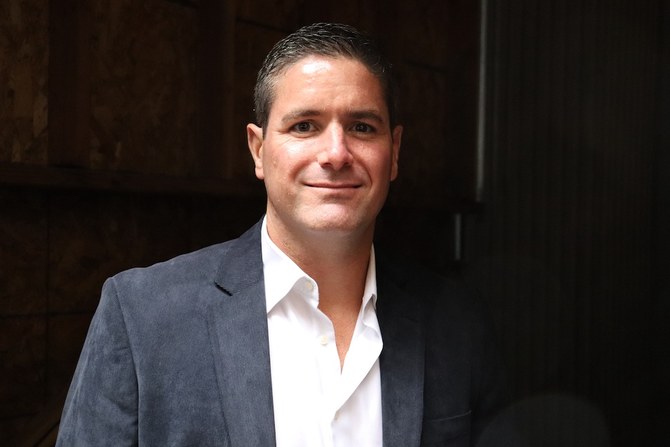RIYADH: Global Amazon agency and marketplace consultancy Podean has been officially launched in the Middle East, with a regional headquarters in Dubai.
In 2017, the Middle East and North Africa (MENA) e-commerce market reached $8.3 billion with an average annual growth rate of 25 percent. In 2020, e-commerce expenditure exceeded expectations by more than $52 billion since the coronavirus disease (COVID-19) lockdown began in March – up 77 percent year-on-year. And at the forefront of this surge was Amazon.
In the UAE alone, 46 percent of shoppers use Amazon with Noon being a distant second at 16.9 percent.
Mark Power, founder and CEO of Podean, spoke to Arab News about the Amazon ecosystem and how his agency can help brands succeed on the platform.
Podean launched in New York 9 years ago and has since expanded to the UK, Australia, and the Middle East. Power comes from an agency background having worked at The Interpublic Group of Companies (IPG).
“Holding companies (such as IPG) are very sophisticated and they have huge scale and they help brands in a very sophisticated way when it comes to media and creative but they really don’t understand the nitty gritty of the world of e-commerce and retail and they have a lot of trouble working out how to make money from it,” he said.
On the other hand, he added, Amazon-focused agencies were usually started by ex-Amazon employees who have a siloed approach.
“We believe Amazon should be ultimately integrated with everything else you’re doing as a brand. You can’t just look at Amazon as a pure sales channel, it is much more than that; it’s a vast array of properties, experiences, and content,” Power said.
A common challenge is that most brands and businesses think of Amazon as a sales or retail channel simply to place their product on.
“It doesn’t get the love it really needs because Amazon has now given people access to tools to make their products stand out, and if you’re not doing that you can quickly lose out on precious sales and valuable traffic or not convert that traffic because you haven’t invested and you haven’t sort of adjusted to the new the new Amazon reality,” he added.
As of 2018, Facebook and Google commanded around 70 percent of digital advertising dollars while Amazon’s share was roughly 7 percent and it has surely increased – beyond regular forecasts – this year.
Amazon’s consumer growth has been supported by the launch of initiatives and products for businesses such as the Amazon Marketing Cloud and its demand-side platform (DSP), which allows brands to place display and video ads across Amazon’s websites and apps.
This year has also marked a significant milestone for the e-commerce giant with product searches on Amazon surpassing those on Google in the US. All of this means that brands – even those not selling on the platform – can now also use Amazon for upper-funnel marketing activities, such as brand awareness, and not just for performance marketing. They can also access Amazon’s data to pinpoint the consumer journey and better target audiences.
Power pointed out that the agency’s services were not cannibalizing audiences away from a brand’s direct-to-consumer channel, but rather finding these potential consumers who have visited a brand’s direct-to-consumer channel but prefer the Amazon experience and shaping their consumer journey in a way that is favorable to the brand.
While consumers are flocking to Amazon for everything from toilet paper to electronics, sellers and businesses are expressing concerns as evidenced by the antitrust hearing against Amazon, Apple, Facebook, and Google.
Sellers know that the best place to sell online is Amazon, but it is a tricky situation to be in when Amazon starts selling its own versions of the most popular products.
“It’s hard to make a judgment call. But, at the same time, some of the things that we’ve seen as partners within the Amazon ecosystem doesn’t look good at all,” Power said.
He chalked it down to the silos that exist within Amazon. “Amazon is a siloed business made up of a vast array of different entrepreneurial businesses within different businesses within different businesses and that has caused it to become an incredible success.
“But I think it also can be something where because there are silos and lack of communication, some of those teams go off and do things and they do it fast and so successfully, that it may come at a cost – not just to other teams within Amazon, but also the partners that they’ve built.”
He added that Amazon was now being much more careful as to how it worked with partners, “not just be obsessed with end-consumers which it has been touting for many years.” And this is reflected in the initiatives it has launched to support partners and brands such as its APIs (app programming interfaces) and Brand Registry programs.
Its advertising tools for the Middle East are in the process of being launched starting with the UAE and Saudi Arabia and then Egypt and Turkey, all of which will be served by Podean’s Middle East headquarters in Dubai.
Power said: “It (the Middle East) is a huge market of 230 million people so Amazon’s taking this very seriously because it’s a very strategic market with real volume and real growth.”


























